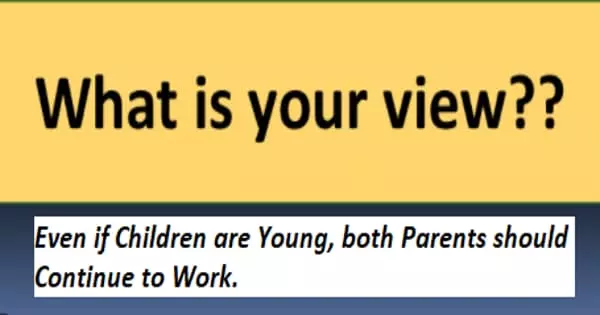To respond to this statement, several factors must be considered. Let’s look at them. For starters, the statement implies the presence of more than one young child. Children are extremely reliant on their caregivers when they are young, not only for their physical but also for their emotional needs. In an ideal world, the mother would fulfill this nurturing role. Looking after the children from infancy would create a bond between the mother and her children that cannot be replaced. She will be there to witness the child’s first steps, to comfort him when he cries, and to laugh with him.
Child experts have also demonstrated that a child’s early years are those in which he can easily learn new knowledge and skills. That is why some parents speak to their unborn children while they are still in their mothers’ wombs or send them to special education programs where they are taught language, math, or musical skills at a young age. If the mother is well-educated, she is in the best position to educate her own children.
Two-income families have a stronger financial foundation and are less likely to face financial difficulties. That benefit will be enjoyed by the children as well, who are not immune to worrying about the family’s financial situation. More money means better daycare, early education, and private schooling. Families can obtain better health care, save more for their children’s college education, enjoy more family nights out, and take more frequent vacations that are nicer and longer than they could otherwise afford.
Of course, all of this is based on the assumption that the father is unwilling to give up his job to care for his children. There is, however, a subset of men who want to be househusbands and enjoy childcare tasks such as feeding, bathing, and changing their children’s diapers. If the family can afford for the father to not work, there should be no problem with the husband taking on the role of “house minder” in the family.
However, society generally assumes that the mother is the one who looks after the children if she wishes to be the ‘house minder.’ There are an increasing number of highly educated women who earn a good living and have good career opportunities but may not be willing to give up the glamour of such work to become involved in domestic issues or be a housewife.
Much depends on the family’s financial commitments when deciding whether both parents should work. The properties of couples will be calculated. If the family is burdened with the expenses of owning a car, paying off a mortgage, or caring for elderly parents, both husband and wife may decide to work to cover family expenses and maintain an expected standard of living.
When deciding whether or not a mother should work, the issue of childcare must be addressed. Does the state provide adequate childcare subsidies and a network of high-quality childcare centers to ensure that children are cared for while their mothers work? In this regard, a mother’s willingness to work is influenced by her employer’s support for working mothers.
If the mother’s earnings from work are barely enough to cover the cost of fostering her children to childminders, she may seriously consider staying at home instead. If the mother decides to work outside the home, the issue of alternative childcare arises once more. If she has parents or relatives who would be willing to care for her children, she may decide to work.
Aside from the advantages for the baby and the bank account, there are also advantages to being a working couple. When both parents share household responsibilities equally, the couple may be happier, better able to relate to one another and enjoy a greater sense of harmony. Working parents must equally co-parent, coordinate activities, and collaborate to make school events, rehearsals, and sports practices easier for their children.
Many parents are aware of the drawbacks of employing nannies or maids to care for their children. Because these childminders are not responsible for their own children, they may lack the love and concern that mothers do. Again, some maids may be preoccupied with domestic duties, causing the children to be overlooked. To keep these children occupied and entertained, they are frequently ‘planted’ in front of the television set.
As a result, whether both parents should work when their children are very young is dependent on a variety of factors, and the parents must make an informed decision for the sake of their children and the well-being of their family.
















